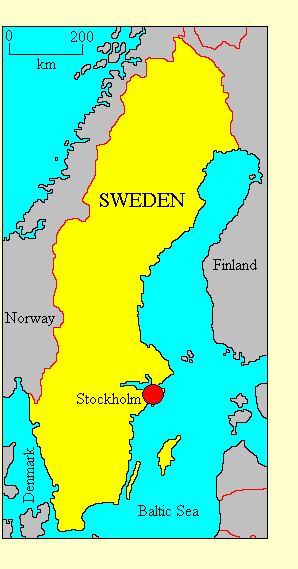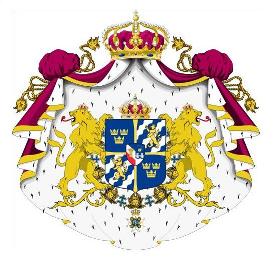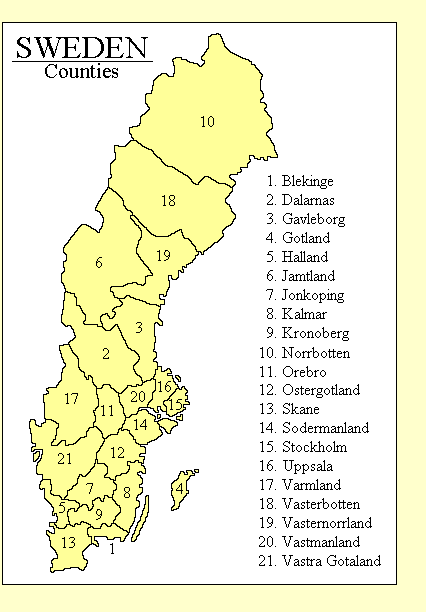

KINGDOM OF SWEDEN
• Official name: Konungariket Sverige (Kingdom of Sweden)
• Location: Northern Europe
• International organisations: Council of Europe, European Union, Organisation for Economic
Co-operation and Development, Organisation for Security and Co-operation in Europe, United Nations, World Trade Organisation
• Borders: Finland, Norway
• Coastline: Baltic Sea
• Land area: 449,964 Km2
• Population: 9,300,000
• Annual GDP (PPP) per capita: US$36,800 (2009 CIA estimate). World ranking: 20
• Ethnicity: Almost the entire population is of Swedish stock. There are small minorities of recent immigrants from
European and Middle Eastern countries.
• Languages: Swedish is the official language and is univerally understood. There is a small Finnish-speaking minority,
and Turkish and other immigrant languages are used. Sami indigenous languages survive in remote areas.

• Religion: 87% of the population are nominally Protestant Christians, but religious practice has radically declined.
There are small Catholic, Orthodox and Moslem minorities.
• Form of government: Constitutional monarchy and parliamentary democracy. Sweden is divided into 21 counties.
• Capital: Stockholm
• Constitution: The Constitution of Sweden came into effect
on 1 January 1975.
• Head of state: Carl XVI Gustav, King of Sweden since 19 September 1973.
• Head of government: The Prime Minister, appointed by the King. The Prime Minister is usually the leader of the largest party in the legislature, to which he is accountable.
• Legislature: Sweden has a unicameral legislature, the National Assembly (Riksdag), which has 349 members elected four four-year terms by proportional representation from multi-member constituencies.
• Electoral authority: The Election Authority conducts national elections.
• Freedom House 2011 rating: Political Rights 1, Civil Liberties 1
• Transparency International Corruption Index: 92% (4 of 178 countries rated)
• Reporters Without Borders Press Freedom 2010 Index: 100% (1 of 178 countries rated)
• Heritage Foundation Economic Freedom 2010 Index: 71.9% (22 of 178 countries rated)
Political history
Until the mid 19th century Sweden was an absolute monarchy, whose politics revolved
mainly around the struggle for power between the throne and the aristocracy. Sweden was
united with Norway in 1814. In 1867 King Karl XV agreed to a revision of the Constitution
whereby power was transferred to a prime minister accountable to the legislature, and during
the later 19th century Sweden became a full parliamentary democracy. Norway became independent in 1905.

A powerful labour movement arose in the 1890s, and in 1932 the
Social Democrats came to power.
Except for the periods 1976-82 and 1991-94, they were in office for 70 years, under three dominant
prime ministers: Per Albin Hansson (1932-46), Tage Fritiof Erlander (1946-69) and
Olof Palme (1969-76 and 1982-86). The Social Democrats created the world's
most advanced welfare state and became a model for democratic socialist parties everywhere.
Since Palme's assassination in 1986, high taxes and increasing social discord have weakened support for the
"Swedish model." The Social Democrats were comfortably re-elected in 2002, but narrowly defeated in 2006. They are
generally supported by parties to their left, the Left Party, which
has replaced the old Communist Party, and the The Greens.
The Social Democrats have always been helped by the divisions among their opponents. The
conservative Moderate Party, led by the current Prime Minister
Fredrik Reinfeldt, is the
largest centre-right party, but it has to compete with the liberal People's Party,
the Christian-Democrats and the
Centre Party. The extreme right
Swedish Democrats first gained representation at the 2010 elections.
At these election Reinfeldt's government lost its overall majority, but was able to retain power with the tacit support of
the Swedish Democrats. The left also lost ground, suggesting the the long hegemony of the Social Democrats in Swedish
politics is finally over.
Updated November 2011
|


